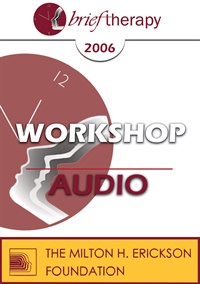BT06 Workshop 04 - The Four Pillars of Relationship Change - Ellyn Bader, PhD
- Average Rating:
- Not yet rated
- Topic Areas:
- Workshops | Relationships | Therapist Techniques
- Categories:
- Brief Therapy Conference | Brief Therapy Conference 2006 | Pioneers in Couples and Family Therapy
- Faculty:
- Ellyn Bader, PhD
- Duration:
- 2:30:43
- Format:
- Audio Only
- Original Program Date:
- Dec 07, 2006
- License:
- Never Expires.
Description
Description: Discover Ellen Bader's groundbreaking developmental model for couples therapy. Learn the Four Pillars of Change, practical intervention strategies, and communication techniques to help couples break destructive patterns and build more resilient relationships. Through case studies and interactive demonstrations, therapists will gain tools to facilitate emotional healing and personal growth in brief therapy settings.
Syllabus Description: Difficult couples challenge therapists with their aggressive interactions, their demands for intimacy, and the repetition of unyielding negative cycles. Dr. Bader will demonstrate how to use a developmental approach to target change in brief couples therapy by focusing on one of four pillars of change. Attendees will learn to take a strong leadership role so that clients change faster, with less conflict and more cooperation.
Educational Objectives:
- To identify four nodal points of intervention with couples in distress.
- To demonstrate how to facilitate rapid repair of relationship ruptures.
*Sessions may be edited for content and to preserve confidentiality*
Credits
Handouts
| Timestamped Transcript (1 MB) | 25 Pages | Available after Purchase |
| Timestamped Transcript (1.2 MB) | 32 Pages | Available after Purchase |
| Ericksonian Learning Snapshot (277.8 KB) | 3 Pages | Available after Purchase |
Faculty

Ellyn Bader, PhD Related Seminars and Products
Ellyn Bader, PhD, is a founder and director of The Couples Institute in Menlo Park, California. As a clinical psychologist, workshop leader, author, and speaker, she is dedicated to helping couples create extraordinary relationships. Over the past 30 years she has trained therapists in couples therapy throughout the United States as well as Europe, Asia, South America, and Australia. She served as a Clinical Faculty in Stanford University School of Medicine for 8 years.


